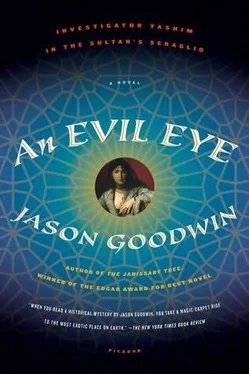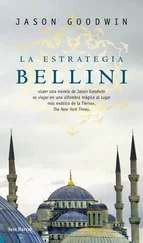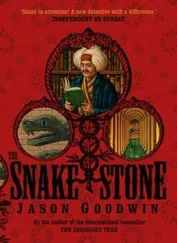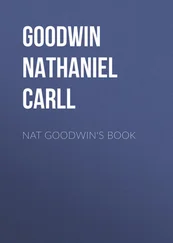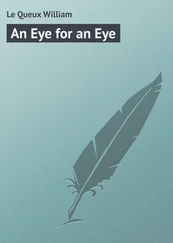Jason Goodwin - An Evil eye
Здесь есть возможность читать онлайн «Jason Goodwin - An Evil eye» весь текст электронной книги совершенно бесплатно (целиком полную версию без сокращений). В некоторых случаях можно слушать аудио, скачать через торрент в формате fb2 и присутствует краткое содержание. Жанр: Исторический детектив, на английском языке. Описание произведения, (предисловие) а так же отзывы посетителей доступны на портале библиотеки ЛибКат.
- Название:An Evil eye
- Автор:
- Жанр:
- Год:неизвестен
- ISBN:нет данных
- Рейтинг книги:3 / 5. Голосов: 1
-
Избранное:Добавить в избранное
- Отзывы:
-
Ваша оценка:
- 60
- 1
- 2
- 3
- 4
- 5
An Evil eye: краткое содержание, описание и аннотация
Предлагаем к чтению аннотацию, описание, краткое содержание или предисловие (зависит от того, что написал сам автор книги «An Evil eye»). Если вы не нашли необходимую информацию о книге — напишите в комментариях, мы постараемся отыскать её.
An Evil eye — читать онлайн бесплатно полную книгу (весь текст) целиком
Ниже представлен текст книги, разбитый по страницам. Система сохранения места последней прочитанной страницы, позволяет с удобством читать онлайн бесплатно книгу «An Evil eye», без необходимости каждый раз заново искать на чём Вы остановились. Поставьте закладку, и сможете в любой момент перейти на страницу, на которой закончили чтение.
Интервал:
Закладка:
“I am where I hope I can be most useful, hanum efendi,” he replied. “And in the Abode of Bliss, are you not under the gaze of the all-powerful sultan?”
Talfa turned her head slightly and a dimple appeared on her cheek.
“The sultan has so many cares, Yashim efendi.” She gave him a slanting gaze under her lashes. “It isn’t fair that you should leave it all to him. And you were very good the other day. You could be so useful here, efendi.”
She giggled lightly.
Yashim bowed, and felt his blood run cold.
26
As the caique turned up against the sluggish current, Palewski leaned back on the hard cushions and stared at the footings of the new bridge.
For centuries, people had talked about throwing a bridge across the Golden Horn. On the Stamboul side lay the bazaars, the palaces, and the temples of faith; on the Pera side lived the foreign community, now a mixed bag of Italians and Levantines, who operated so many of the commercial enterprises of the empire. The great Byzantine emperor Justinian, who gave his city the incomparable Ayasofya, was supposed, by some, to have strung a chain of boats across the waterway. If he had done so, only the idea of the chain had survived: medieval Constantinople had protected itself from attack on the seaward side by hauling a massive chain, whose links weighed fifty pounds apiece, across the mouth of the Horn. In 1453, when the city fell to the Ottoman Turks, Mehmet II had dragged his ships over land to get around it.
Fifty years later, the renaissance master Leonardo da Vinci had submitted a design for a bridge shaped like a curving bow, or a crescent; the sketch was put on file and forgotten. Three centuries passed. Then the late sultan-proponent of change everywhere in the empire-entrusted the project to his favorite, the Kapudan pasha Fevzi Ahmet, commander of the fleet. A man who had a reputation for getting things done.
Palewski sighed. Where the great plane tree that shaded the shoreline on the Pera side had stood, the ground looked dusty and hard-baked. The pasha’s bridge would be as ugly and practical as any of the new buildings that had disfigured the old city in the past twenty years-the commercial houses of Pera, the blank barracks of the New Troop on Uskudar, the sultan’s hideous new palace at Besiktas. Worst of all, he thought, it would dissolve the ancient distinction between Stamboul, with its palaces and domes and bazaars, and modern, commercial Pera across the Horn.
It was growing dark when the caique dropped him at the Balat stage. Palewski tipped the oarsman and made his way unhurriedly through the steep streets before stopping at a sunken doorway picked out in bands of red and white stone. The widow Matalya opened the door and Palewski removed his hat.
“Gone out, efendi,” the old lady remarked. “Messengers back and forth, and I don’t know what. Would you like to wait?”
Palewski agreed, and went on up to Yashim’s apartment carrying his old portmanteau, stuffed with a shawl. Wrapped in the shawl was an excellent brandy-1821-which the French ambassador had once given him, though Palewski had forgotten why. He sat on the divan while the familiar outlines of the flat bled into darkness; just before it became too dark to see, he stood up and fumbled with the lamp. In Yashim’s kitchen various plates and bowls were covered with muslins. The brazier was barely warm: he poked his finger into the coals, then wiped the soot off absently on his coattails. At last he found a piece of bread and a painted glass, and settled down to read Yashim’s latest Balzac.
At the beginning of chapter three he eased off his shoes and drew his feet up onto the divan.
27
The great oda, overlooking the Bosphorus, emptied out. The orchestra packed up their instruments. The ladies of the harem drifted away. The children were shepherded off by the black eunuchs, still sniffling. It had been a very remarkable day; not an auspicious one. There was lots to discuss later.
Only the lady Talfa remained, with her slave.
“Bring me coffee.”
Yusel heaved herself to her feet and was about to waddle off when she raised her hands in surprise. “What have we here?”
On the carpet at the foot of the divan sat a little girl, fast asleep, with her head on her knees.
Yusel bent down and shook her gently. “Best run along now, little one.”
The girl saw Yusel bending over her and scrambled to her feet, looking blankly from Yusel to the lady Talfa.
Yusel mimed a low temmena, a bow with the hand almost trailing the ground. The girl took the hint. She presented Talfa with a graceful bow.
She looked about five years old.
“Very pretty, very nice,” Talfa murmured. The sad events of the afternoon had put her into a good mood. “And what, little one, is your name?”
“Roxelana, hanum.”
“Charming! And tell me, Roxelana, who looks after you?”
Roxelana glanced down and traced a pattern in the carpet with her little slippered foot. “No one, hanum.”
Talfa frowned. “No one? Where do you sleep?”
“I sleep-with the girls.” She slid her foot against her leg. “Wherever I am, hanum.”
“The Kislar aga knows about this? And Bezmialem?”
The little girl glanced up, biting her lip.
The princess let out an exasperated sigh. “It’s a muddle, that’s clear. Never mind, I’m glad we’ve had a little chat. I will see that something is done for you.”
Roxelana looked down at her slippers and stirred her foot on the dark flags. “You won’t send me away, hanum?”
“What a ridiculous notion!” Talfa giggled. “As long as you behave yourself, my dear, you’ll stay in the harem forever and ever. Now run along. You can visit me this evening, after prayers, and we’ll see what can be done.”
The little girl bowed again, and walked with self-conscious solemnity to the door of the oda.
At the door she turned and flashed a timid smile. “Thank you, my princess.”
Talfa waggled her fingers. A small smile hovered on her lips.
28
After the funeral the young man sold his sheep and the standing corn.
He thought long and hard about his inheritance, knowing the pasha would have to die.
It was not a question of rank. It was a matter of retribution.
A matter of honor. He had already chosen his weapon: it would be a knife. A knife because it was easy to conceal, and very sure. He had slaughtered many animals with this knife.
Istanbul was a long way off, of course. But he knew the roads the camels took, as far as the boundary of his province. There would be people after that, to show him the way.
No one would notice the knife.
29
“ Balzac!” Palewski exclaimed, as Yashim came in. “Acceptable in small doses, with brandy. I thought you’d never come.”
“It’s Thursday,” Yashim objected. “I always come.”
“I know,” Palewski said, tossing the book aside. “You have nobody else to cook for.”
Yashim raised an eyebrow. “The Prophet, may he be praised, instructed the faithful to give charity,” he replied, turning to the kitchen. “Especially to the friendless.”
“Litwo! Ojczyzno moja! ty jeste jak zdrowie,” Palewski declaimed. “I am alone in a foreign land.”
While Yashim set out the dishes, Palewski grumbled about the new bridge. “Ghastly. I had hoped, with the Kapudan pasha away with the fleet, that work would grind to a halt. No such thing-it’s all modern methods now.” He picked up a slice of stuffed mackerel and held it in midair. “You look tired, Yashim.”
Yashim gave him a weary smile. “Husrev Pasha thought the Russians should know about their missing friend. The Fox was not very informative.”
Читать дальшеИнтервал:
Закладка:
Похожие книги на «An Evil eye»
Представляем Вашему вниманию похожие книги на «An Evil eye» списком для выбора. Мы отобрали схожую по названию и смыслу литературу в надежде предоставить читателям больше вариантов отыскать новые, интересные, ещё непрочитанные произведения.
Обсуждение, отзывы о книге «An Evil eye» и просто собственные мнения читателей. Оставьте ваши комментарии, напишите, что Вы думаете о произведении, его смысле или главных героях. Укажите что конкретно понравилось, а что нет, и почему Вы так считаете.
